For most people, a pilgrimage to the Lunar New Year market on Dihua Street (迪化街), which officially kicks off today, is a rare assault on the senses. But shopkeepers such as Lin Wei-ting (林薇婷), who grew up around her family’s steamed bun shop in Yongle Market (永樂廣場), have been knee-deep in the festivities every year for as long as they can remember.
“I’ve been here since birth,” Lin says, as she maneuvers a large and delicate slab of braised pork belly onto a tray. At Lao Chu Tzu Sanfa Steamed Buns (老竹子三發包子), customers eye the guabao (割包), a flat steamed bun stuffed with braised pork, cilantro and ground peanuts that Lin makes exclusively for weiya (尾牙, end-of-year banquets to thank employees).
Outside, hawkers’ cries and decorations spill out from both sides of the street. The old western part of the city, where long-established shops still sell traditional goods such as tea, confectionery and dried foods, is the original location of Taipei’s Lunar New Year market. This year’s market is expected to draw as many as 300,000 revelers and will stay open right up until Lunar New Year’s eve on Feb. 3.
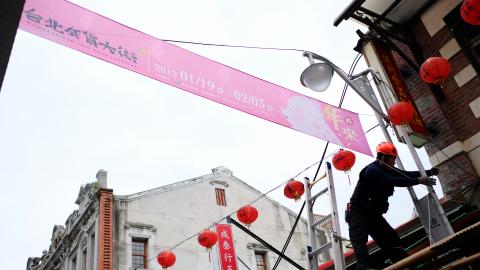
Photo: Davina Tham, Taipei Times
To capitalize on the boundless crowds, shopkeepers prepare a variety of products catering to cherished traditions. Lin says that her customers are picky eaters, so her festive menu includes taro puree and eight-treasure rice for waishengren (外省人, people who migrated to Taiwan after the Chinese Civil War) as well as steamed radish cake for benshengren (本省人, people who arrived before World War II).
Earthly delights aside, the Lunar New Year is an especially crucial time to bai bai (拜拜, ask for blessings) and make sure that all is well with one’s otherworldly credit score. Lin says that her shop does a roaring trade during this season because many people buy steamed buns to make offerings to deities and ancestors.
At the family-run, century-old Lien Hui Buddhist Embroidery Shop (聯暉佛具?莊), walls are festooned with tapestries depicting spectacular dragons and stern-faced deities as well as other glittery ritual accoutrements.
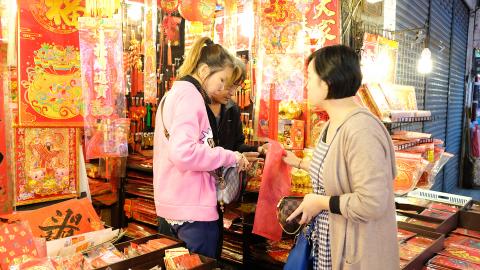
Photo: Davina Tham, Taipei Times
Tung Chen-hsi (童振熙) hunches over the ornate prayer flag he is putting together for a custom order. He says that the Lunar New Year remains the busiest time of the year for him, even as prayer practices have changed with modernization. Due to space constraints and the pace of life in Taipei, fewer people keep altars at home these days, and most of his work is now done for temples rather than for personal use.
“But there is a difference between the north and the south,” he says. Tung maintains a clientele as far south as Kaohsiung and Tainan, where he says households still place an emphasis on prayer traditions.
Regardless, some human concerns are timeless and universal. As I am about to exit the shop, Tung’s elderly mother approaches to chat about her sickly daughter-in-law, outstanding grandsons and sizeable real estate holdings. Then she zooms in for the kill, asking how old I am.
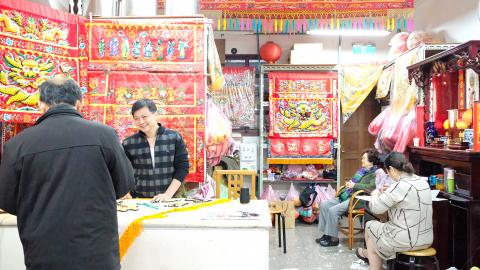
Photo: Davina Tham, Taipei Times
To my response, which is older than she would like, she says, “It’s too bad, my grandson is 25, otherwise I would introduce you two to get to know each other.”
I leave filled with admiration at her little stratagem, a practical alternative to hopeful prayers for love and marriage at Xiahai City God Temple (霞海城隍廟) just down the street.
THREE LITTLE PIGGIES
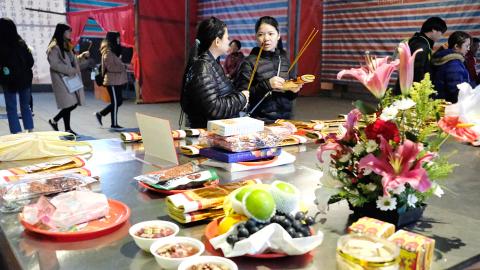
Photo: Davina Tham, Taipei Times
In a continuation of efforts to promote commerce and culture in the Dadaocheng (大稻埕) neighborhood where Dihua Street is located, the Taipei City Government and Taipei City Office of Commerce are weaving a dose of wry humor, competition and augmented reality into this year’s market.
To welcome the year of the pig, three porcine Nian Shou (年獸) beasts embodying common behaviors of the holiday season are being trotted out: a “greedy pig” (吃吃獸) that loves to eat but is afraid of putting on weight, a “mouthy pig” (嘴嘴獸) that asks nosy questions and a “lazy pig” (懶懶獸) that doesn’t want to go anywhere because of traffic.
Deputy Mayor Teng Chia-chi (鄧家基) says that the mascots were designed to appeal to younger generations and build up anticipation for the Lunar New Year festivities.
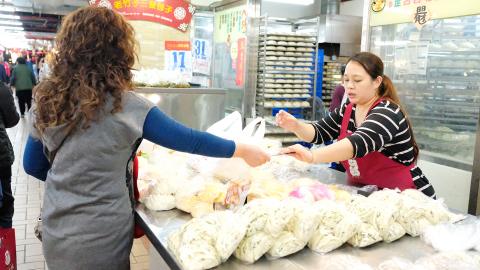
Photo: Davina Tham, Taipei Times
The mascots will feature on special coins and red packets to be given out by Mayor Ko Wen-je (柯文哲) at scheduled times during the market. Vistors who download the Taipei Friendly Go! mobile application will also be able to defeat the Nian Shou and win prizes through an augmented reality game set in Yongle Market, the designated lair of the beast.

Photo courtesy of Taipei City Office of Commerce

This month the government ordered a one-year block of Xiaohongshu (小紅書) or Rednote, a Chinese social media platform with more than 3 million users in Taiwan. The government pointed to widespread fraud activity on the platform, along with cybersecurity failures. Officials said that they had reached out to the company and asked it to change. However, they received no response. The pro-China parties, the Chinese Nationalist Party (KMT) and Taiwan People’s Party (TPP), immediately swung into action, denouncing the ban as an attack on free speech. This “free speech” claim was then echoed by the People’s Republic of China (PRC),

Exceptions to the rule are sometimes revealing. For a brief few years, there was an emerging ideological split between the Democratic Progressive Party (DPP) and Chinese Nationalist Party (KMT) that appeared to be pushing the DPP in a direction that would be considered more liberal, and the KMT more conservative. In the previous column, “The KMT-DPP’s bureaucrat-led developmental state” (Dec. 11, page 12), we examined how Taiwan’s democratic system developed, and how both the two main parties largely accepted a similar consensus on how Taiwan should be run domestically and did not split along the left-right lines more familiar in

Specialty sandwiches loaded with the contents of an entire charcuterie board, overflowing with sauces, creams and all manner of creative add-ons, is perhaps one of the biggest global food trends of this year. From London to New York, lines form down the block for mortadella, burrata, pistachio and more stuffed between slices of fresh sourdough, rye or focaccia. To try the trend in Taipei, Munchies Mafia is for sure the spot — could this be the best sandwich in town? Carlos from Spain and Sergio from Mexico opened this spot just seven months ago. The two met working in the

Many people in Taiwan first learned about universal basic income (UBI) — the idea that the government should provide regular, no-strings-attached payments to each citizen — in 2019. While seeking the Democratic nomination for the 2020 US presidential election, Andrew Yang, a politician of Taiwanese descent, said that, if elected, he’d institute a UBI of US$1,000 per month to “get the economic boot off of people’s throats, allowing them to lift their heads up, breathe, and get excited for the future.” His campaign petered out, but the concept of UBI hasn’t gone away. Throughout the industrialized world, there are fears that